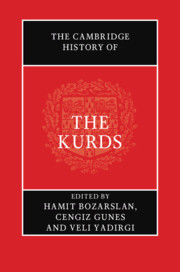Book contents
- The Cambridge History of the Kurds
- The Cambridge History of the Kurds
- Copyright page
- Contents
- Figures
- Maps
- Tables
- Contributors
- Acknowledgements
- Abbreviations
- Additional material
- Introduction
- Part I Historical Legacies
- Part II Regional Political Developments and the Kurds in the Twentieth and Twenty-First Centuries
- 7 Kurds and Kurdish Nationalism in the Interwar Period
- 8 From Tribal Chiefs to Marxist Activists
- 9 Kurdish Politics across the Middle East during the 1970s
- 10 Dark Times
- 11 Kurds in a New Century
- Part III Domestic Political Developments and the Kurds in the Twentieth and Twenty-First Centuries
- Part IV Religion and Society
- Part V Kurdish Language
- Part VI Art, Culture and Literature
- Part VII Transversal Dynamics
- Index
- References
11 - Kurds in a New Century
Prospects and Challenges
from Part II - Regional Political Developments and the Kurds in the Twentieth and Twenty-First Centuries
Published online by Cambridge University Press: 13 April 2021
- The Cambridge History of the Kurds
- The Cambridge History of the Kurds
- Copyright page
- Contents
- Figures
- Maps
- Tables
- Contributors
- Acknowledgements
- Abbreviations
- Additional material
- Introduction
- Part I Historical Legacies
- Part II Regional Political Developments and the Kurds in the Twentieth and Twenty-First Centuries
- 7 Kurds and Kurdish Nationalism in the Interwar Period
- 8 From Tribal Chiefs to Marxist Activists
- 9 Kurdish Politics across the Middle East during the 1970s
- 10 Dark Times
- 11 Kurds in a New Century
- Part III Domestic Political Developments and the Kurds in the Twentieth and Twenty-First Centuries
- Part IV Religion and Society
- Part V Kurdish Language
- Part VI Art, Culture and Literature
- Part VII Transversal Dynamics
- Index
- References
Summary
“The twentieth century saw Kurds suffering from harsh discriminatory and assimilationist polices at the hands of central governments dominated by Turkish, Persian and Arab political elites. With the turn of the twenty-first century, however, the once-marginalized Kurds have emerged as key players in the rapidly changing Middle East. Despite a growing sense of optimism, however, serious obstacles remain as Kurds make progress towards political recognition. In this chapter, the challenges and opportunities the twenty-first century has brought about are examined with the aim of shedding light on domestic, regional and global dynamics in assessing the prospects of Kurdish aspiration for recognition in the new century.”
Keywords
- Type
- Chapter
- Information
- The Cambridge History of the Kurds , pp. 289 - 308Publisher: Cambridge University PressPrint publication year: 2021



